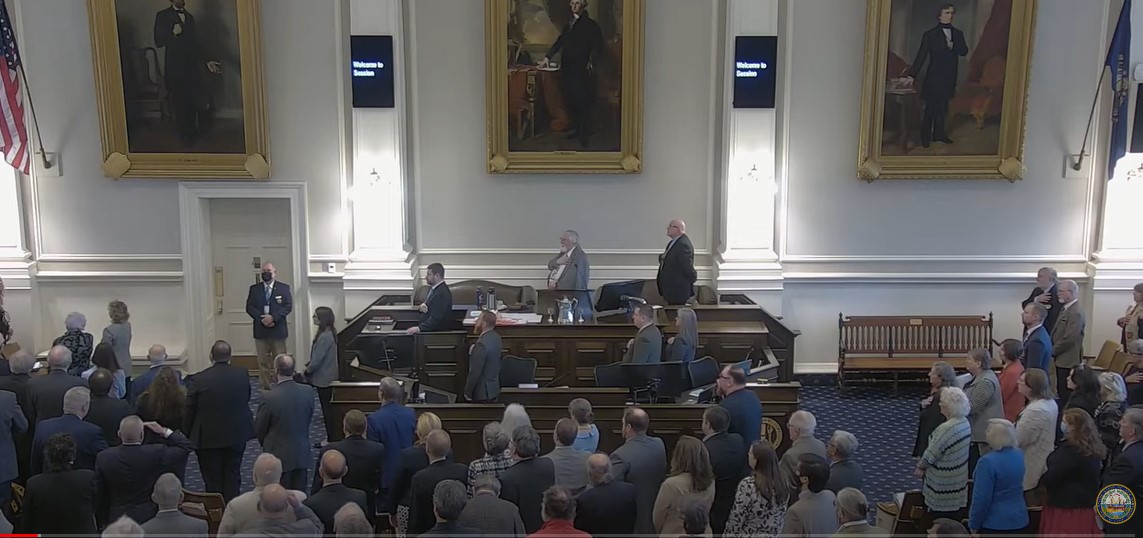By PAULA TRACY, InDepthNH.org
CONCORD – In a strong show of bipartisan unity, the House voted 356-6 to support New Hampshire’s role of holding the first-in-the-nation, as it is under attack by the Democratic National Committee.
The lower chamber concurred with the Senate to support SCR 1.
Members noted that they stood together to oppose challenges by the Republican National Committee in both 2008 and 2012 and together they stood again to protect the voice of the “underdogs” claiming it helps both unknown candidates as well as the state’s stature.
There were no representatives speaking in opposition to the resolution.
The six Representatives voting against the bill were: Sherry Dutzy, D-Nashua; Allan Howland, D-Durham; John Hunt R-Rindge; Lucius Parshall, D-Marlborough; David Preece D-Manchester; and Amanda Toll, D-Keene.
Dutzy said she thought about it for a long time, but believes in the long run the New Hampshire primary is very inefficient that so much attention is paid to it.
“It wasn’t a vote I enjoyed making,” but one she needed to do to be true to herself, Dutzy said.
She said a New England primary would be more effective and efficient and more diverse.
“It would be more inclusive in terms of what America looks like,” Dutzy said.
New Hampshire law states that voters here will go first in all Presidential Primaries across the nation.
While the Republican National Committee has agreed to allow New Hampshire to go first in 2024, the Democratic National Committee has chosen South Carolina, claiming it is more diverse and ordering New Hampshire to go second only if it gives up that law.
The state has refused and it is too late for New Hampshire to change that law.
The DNC is now saying New Hampshire will need to vote on March 5, the so-called “Super Tuesday” with many other states.
If New Hampshire defies that, and votes first, the DNC is threatening strict sanctions including a loss of delegates and exclusion from debates for candidates who campaign here.
Rep. Connie Lane, D-Concord, said the resolution sends a “message loud and clear” that the state worked hard to establish its primary and will work hard to retain it.
The bill passed out of the House Election Law Committee on a vote of 18-0.
The concurrent resolution reads “Whereas, New Hampshire first held a primary election for president in 1916, and has held the first in the nation presidential primary since 1920; and Whereas, New Hampshire’s first in the nation presidential primary is a historic and valued landmark in our state and our nation’s democratic culture; and Whereas, New Hampshire voters have consistently and proudly had one of the highest participation rates in the nation, cherishing their role in vetting presidential candidates through person-to-person, grassroots campaigning; and Whereas, the need to engage with voters across New Hampshire provides a necessary proving ground for candidates wishing to serve in the most powerful office in the world, not only testing their political skills but better preparing them for the Oval Office; and Whereas, attempts by national political organizations to alter the presidential nominating calendar and dictate election laws to the people of New Hampshire have been met with widespread, bipartisan condemnation; and Whereas, New Hampshire’s first in the nation presidential primary has grown over the past century into a vital part of our state’s identity; now, therefore be it Resolved by the Senate, the House of Representatives concurring:
That the general court of the state of New Hampshire hereby affirms its support for New Hampshire’s first in the nation presidential primary, and its confidence in the secretary of state to ensure that New Hampshire’s primary maintains its legal and proper status at least one week before any similar nominating contest.
That the general court expects all political parties to respect the results of New Hampshire’s first in the nation presidential primary by seating the delegates selected by New Hampshire voters at their national nominating conventions.”
In other House action, Thursday, it approved a measure that would expand net metering on solar arrays under Senate Bill 79 by a vote of 194-179.
The measure https://www.gencourt.state.nh.us/bill_status/billinfo.aspx?id=987&inflect=2 would allow for electric customers to increase the amount of electricity they produce and sell back to utilities from 1 megawatt to up to 5 megawatts.
Rep. Michael Harrington, R-Strafford, said it guarantees to raise electric rates for consumers and the bill does not have reliability in transmission as there is no obligation to sell.
Others said the cost shift was not large and likely only one cent on a dollar or 1 percent and that it would advance the state’s renewable power supply where the state is currently lagging.





